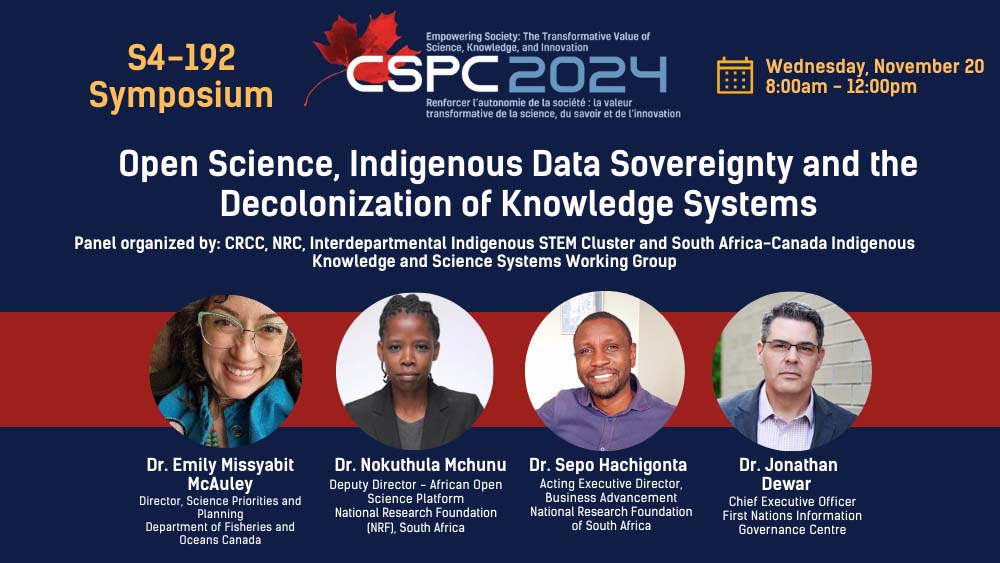Symposium: S4-192
Open Science, Indigenous Data Sovereignty and the Decolonization of Knowledge Systems
Organized by: Canada Research Coordinating Committee, National Research Council of Canada, Interdepartmental Indigenous STEM Cluster and South Africa-Canada Indigenous Knowledge and Science Systems Working Group
Panel Date: November 20, 2024
Speakers:
Dr. Emily Missyabit McAuley
Dr. Nokuthula Mchunu
Dr. Hachigonta
Dr. Jonathan Dewar
Abstract:
The Global Indigenous Data Alliance has called for a critical reformulation of Open Data and Open Science principles, noting that their focus on increased data sharing ignores power differentials and historical contexts. Similarly, researchers and practitioners from the Global South have warned that the push for increased data accessibility and interoperability – and the infrastructures and systems through which data circulate – are often entangled with extractive colonial practices. This session invites a reexamination of Open Science principles through the lens of initiatives that seek to advance the decolonization of knowledge systems and affirm Indigenous information governance and self-determination. Experts will discuss these initiatives, with a focus on the protocols, relationship-building processes, tools and infrastructures that have enabled and shaped them. They will also address challenges, and propose avenues for collaboration, with the Open Science movement with the goal of strengthening culturally relevant and sustainable data and research ecosystems.
Summary of Conversations
The panel explored Indigenous data sovereignty and the decolonization of knowledge systems, emphasizing the need to demystify data and prioritize Indigenous perspectives on information. Key points included recognizing First Nations as sovereign nations over their information, highlighting the principles of ownership, control, access, and possession (OCAP), and addressing the historical context of ongoing settler colonialism. The discussion underscored the importance of building Indigenous institutions while acknowledging the need for Canadian institutions to adapt and change. The panel also addressed the complexities of balancing open science with the protection of Indigenous knowledge and intellectual property, as well as the importance of capacity building across sectors, including Indigenous communities, academic institutions, and government agencies.
Take Away Messages/Current Status of Challenges
- Indigenous data sovereignty is essential for self-determination and requires a shift in perspective from individual rights to collective rights.
- Ongoing settler colonialism and historical power imbalances continue to affect Indigenous control over their information.
- Balancing open science principles with the protection of Indigenous knowledge and intellectual property rights presents a significant challenge.
- Capacity building is needed across all sectors to support Indigenous participation in data governance and research.
- Canadian institutions must adapt to prioritize Indigenous laws, worldviews, and self-governance in information management.
- The complexities within Indigenous communities, including diverse languages, governance structures, and cultural practices, add layers of complexity to data governance strategies.
- Current data strategies must be adaptable to respect diverse Indigenous laws and governance structures at local and regional level.
- Systems of governance must prioritize a decentralized approach of control and respect
Recommendations/Next Steps
- Prioritize building Indigenous-led institutions and information governance systems that reflect First Nations’ laws, worldviews, and collective rights.
- Invest in capacity building initiatives that empower Indigenous communities to make informed decisions about their data and engage effectively with external partners.
- Foster true partnerships and collaborations between Indigenous communities, government agencies, and research institutions, grounded in principles of mutual respect and shared decision-making.
- Develop and implement training programs for government officials and researchers to enhance their understanding of Indigenous data sovereignty, OCAP principles, and cultural protocols.
- Develop mechanisms of implementation of data governance strategies and support Indigenous-led strategies.
- Promote awareness and education within Indigenous communities about the value of their knowledge, the importance of data sovereignty, and the opportunities available for participation in data governance.
- Address existing power imbalances and ensure that Indigenous communities have the resources and support they need to exercise their rights over their information.
- Actively shape conversations around open science to ensure that Indigenous perspectives are centered and that Indigenous knowledge is protected from exploitation.
* This summary has been generated with the assistance of AI tools


